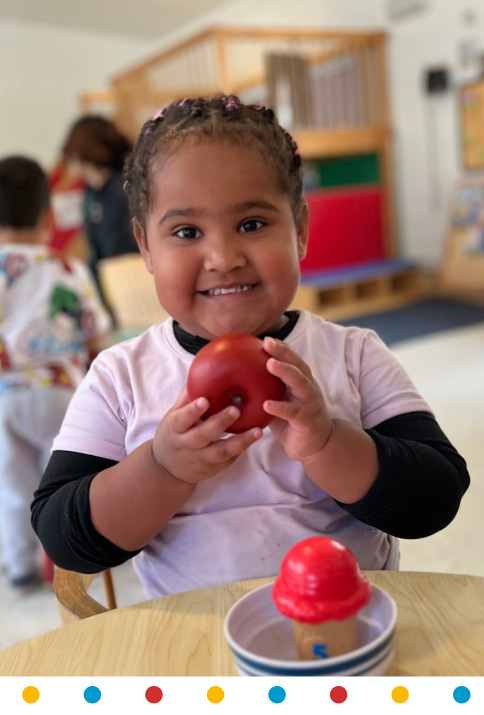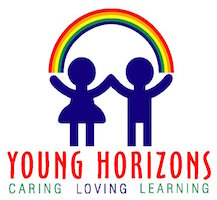Young Horizons’ nutrition program is essential for supporting the healthy growth and development of young children. Our food program ensures that children receive balanced, nutrient-rich meals that promote physical, cognitive, and emotional well-being. It also serves as an opportunity to teach children about healthy eating habits, food choices, and the importance of good nutrition.
Young Horizons is an important source of nutrition for low-income children. Making healthy food choices is vital to children’s growth and development . Learning healthy food choices early in life results in less obesity and overall good health in adulthood.
OUR FOOD PROGRAM:
- Balanced and Nutritious Meals: Serves foods from all the essential food groups: fruits, vegetables, grains, proteins, and dairy (or non-dairy alternatives). Meals are rich in vitamins, minerals, healthy fats, and fiber. We follow the Child and Adult Care Food Program meal patterns.
- Age-Appropriate Portion Sizes: offers meal portions that are tailored to the age and nutritional needs of the children. Preschoolers need smaller portions that meet their energy and growth requirements.
- Variety: A wide range of foods to ensure that children are exposed to different tastes, textures, and nutrients. We rotate menu items regularly to keep meals interesting.
- Cultural and Dietary Inclusivity: Acknowledged and accommodates cultural preferences and dietary restrictions (e.g., vegetarian, vegan, gluten-free, allergy-free). This inclusivity promotes respect for diverse eating habits and supports children with special dietary needs.
- Healthy Snacks: Serves nutritious snack options that complement meals. Snacks include whole fruits, vegetables with dips, yogurt, whole-grain crackers, or small sandwiches. We do not serve sugary, processed, or highly salty snack items.

- Family-Style Eating: offers serves meals family-style. Children serve themselves (with help if needed) from communal bowls or platters. This fosters independence, social interaction, and positive mealtime behaviors.
- Cooking experiences: provides cooking experiences in the classroom that enhance motor skills development, cognitive growth, language and communication skills, sensory development, creativity and imagination, building independence and confidence, and social skills and cooperation.
Nondiscrimination Statement
In accordance with Federal civil rights law and U.S. Department of Agriculture (USDA) civil rights regulations and policies, the USDA, its Agencies, offices, and employees, and institutions participating in or administering USDA programs are prohibited from discriminating based on race, color, national origin, sex, religious creed, disability, age, political beliefs, or reprisal or retaliation for prior civil rights activity in any program or activity conducted or funded by USDA.
Persons with disabilities who require alternative means of communication for program information (e.g. Braille, large print, audiotape, American Sign Language, etc.), should contact the Agency (State or local) where they applied for benefits. Individuals who are deaf, hard of hearing or have speech disabilities may contact USDA through the Federal Relay Service at (800) 877-8339. Additionally, program information may be made available in languages other than English.
To file a program complaint of discrimination, complete the USDA Program Discrimination
Complaint Form, (AD-3027) found online at: http://www.ascr.usda.gov/complaint_filing_cust.html, and at any USDA office, or write a letter addressed to USDA and provide in the letter all of the information requested in the form. To request a copy of the complaint form, call (866) 632-9992. Submit your completed form or letter to USDA by:
(1) mail: U.S. Department of Agriculture Office of the Assistant Secretary for Civil Rights 1400 Independence Avenue, SW Washington, D.C. 20250-9410;
(2) fax: (202) 690-7442; or
(3) email: program.intake@usda.gov.
This institution is an equal opportunity provider.

You must be logged in to post a comment.